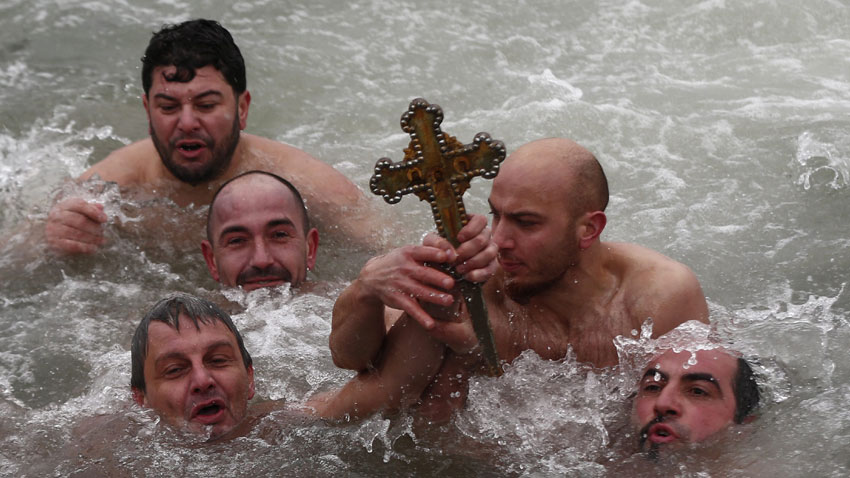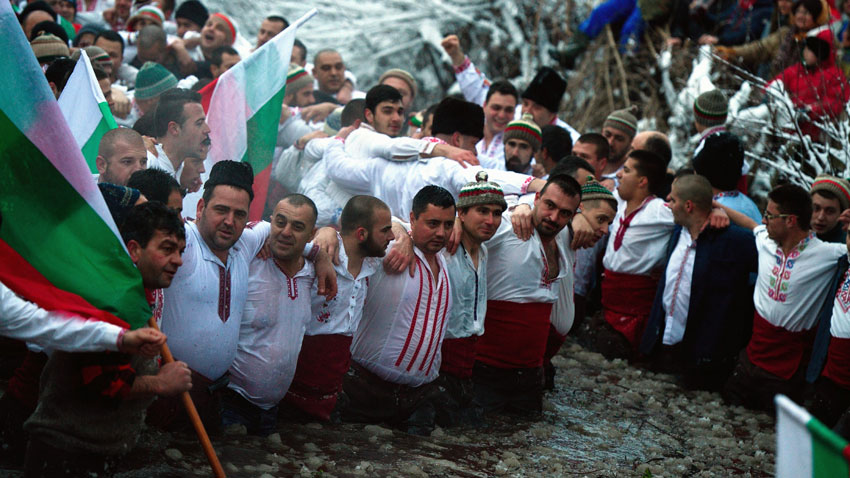After the Christmas and New Year holidays Epiphany and the Synaxis of St. John the Baptist are among the most popular winter holidays in Bulgaria. In the sphere of spirituality they seem to purify the festive atmosphere from the material frames and to raise awareness towards the true values of human existence - love and salvation. These bright winter holidays, also known as Yordanovden and Ivanovden celebrate the baptising of Jesus Christ in the Jordan River and the glory of his Baptist - John the Baptist. On the eve of Epiphany and during the holiday itself, water is sanctified by immersing a cross in it, symbol of the victory of Jesus Christ over death. The ceremony is performed in the middle of an Orthodox Church by a priest reading a special prayer. During the liturgy all water on earth is symbolically sanctified. In Bulgaria, after a solemn liturgy in front of the Holy Synod, battle flags of the army are sanctified.

The tradition dates back to the reign of Tsar Simeon the Great, when before the battle of Aheloy in 917 Bulgarian flags and warriors were blessed with holy water. According to the Bulgarian Orthodox Church, this water is used to remove mental and bodily impurities, so all believers should take some of it and use it throughout the year when body or soul suffers.
Evidence of water sanctification date back to Antiquity. Early in the second century St. Augustine talked about the widespread use of the sanctified water in healing. The very prayers that priests read over it actually call on the Holy Spirit to make the water holy. That is why the faith of the priest who performs the ceremony and the faith of those for whom he does it is of great importance, just like love and dedication, as this love is God himself, who is Spirit of Love. That is why through love one can realize the mystery of the Trinity, which is revealed on Epiphany through Father, Son and the Holy Spirit.
During Epiphany after the solemn liturgy the priest leads people to the nearest water basin to sanctify it. He throws the cross into the water and despite low January temperatures, young and old compete to take the cross out of the water. Old people say that if the weather is clear and the cross freezes into the water, the year would be good and fertile.

According to local traditions, men in the Balkan town of Kalofer clad in folk costumes, step into the icy waters of the Tundzha River to play a famous male horo. The men sing folk songs and believe that those who enter the river would be strong and healthy throughout the year. Interest in the local tradition has been growing and huge crowds gather every year in Kalofer to watch it. According to Mayor, Rumen Stoyanov, "the old ritual meets the requirements of the World Organisation for Cultural Heritage at UNESCO," motivating Kalofer citizens to apply for adding the tradition to the organisations’ list.
The ritual bathing continues also during the next day when the Bulgarian Orthodox Church honors St. John the Baptist - the last Old Testament prophet, also called the Forerunner because he was preparing people for the coming of the Savior. In Bulgarian folk traditions lads "bathe" brides and young girls under the age of 1 in order to purify them with Epiphany water. The so-called “dirty days” (from St. Ignatius Day to Epiphany) are over and people are filled with hope for better times and that their dreams would come true.
English: Alexander Markov
During a visit by the Radio Bulgaria team to the Bulgarian Orthodox Parish "Nativity of the Mother of God" in Geneva, we had the pleasure of meeting Ventseslav Sabev, the son of long-time church history professor at the Sofia Theological Seminary,..
On November 15, 1910, Russian pilot Boris Maslenikov carried out the first airplane flight in Bulgaria. He took off in a Farman-type aircraft from an improvised airfield near Sofia. In the days that followed, several more demonstration flights were..
On 16 April 1879, the deputies of the Constituent Assembly debated, approved and signed Bulgaria’s first constitution, the Tarnovo Constitution. This document established the legal basis for the establishment of the new Bulgarian state following the..

+359 2 9336 661
